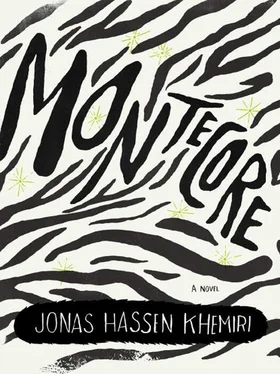5. Here we can inject a separate scene where your father walks the streets of Stockholm with his constantly clicking camera. He captures smoking raggare gangs in Kungsträdgården, smiling mounted police, chess-playing pensioners, waving dog owners, spit-shouting Save-the-Trees demonstrators. He documents lost tourists, gleaming king statues, broken telephone booths, symbolic bridges. And of course your father’s favorite motif, collected in your wardrobe by the hundreds: all the snow-covered, pedal-frozen bicycles, which delight your father’s photographic eye with their inherent conflict.
6. Excuse me, but I just noticed an unparalleled phenomenon on the Eniro Web site: Do you know where Raino’s studio lay localized? Near Regulator Street in Flemingsberg. If you accompany this street to the west it changes its name to Health Street. If you then twist yourself to the right on Katrinebergs Street and continue forward to Mellanbergs Street, and then give way to the right and traverse Nibble Hill … Guess where you’re standing? Chestnut Street! A coincidence, or a sign of fate? Who can separate them? (By the way, do you know how many Chestnut Streets there are in Sweden? Fifty-six! All of these patterns are almost beginning to scare me. To where will this journey be terminated?)
7. Before we wander further I want to repeat you something vital: ALL potential information about Tunisia’s contemporary political situation MUST, for reasons you are surely aware of, be excluded from the book. This is a piece of advice that must become your law, Jonas. It is vital, central, and concentrated that we do not in ANY way, under ANY circumstances, happen to smuggle political views of today’s Tunisia into the book. I presume that I have your understanding about why? You are not solitary in having a Tunisian passport that can cause complications …
Stockholm, July 22, 1978
Greetings, Kadir!
Summer is here! Birds are chirping, lilacs are smelling, and Pernilla has become my official wife! In her cautiously growing stomach she bears my future child! Our collective future is securitized!
We promised each other our eternal promises in a simple ceremony in the courthouse; Pernilla’s two beard-brothers witnessed our joy, but her parents had unfortunately enough been struck by double influenza. This did not dim anyone’s celebration (particularly not mine). Pernilla’s friends cheered our alliance and presented us multitudes of presents: handmade rag rugs, incense burners, Indian shawls, and a darbouka drum. After the ceremony we marched home to the apartment and delighted a quiet evening with salmon pasta and wine.
Pernilla and I are very, very happy and our happy joy is spread to the maximized joy of the general public. 8After our promised alliance, Pernilla and I were invited to the Swedish authorities to be interviewed about our marriage. We were conducted to different rooms, I with an interpreter, Pernilla without.
We were served coffee by smiling suit wearers and interpellated about our respective habits. What does Pernilla intake for breakfast? How often does she brush her teeth? What time does she usually yield her body to sleep? What color does her potential room robe bear? How was she draped when you met for the first time? Their ambition, of course, was to guarantee that our alliance was not motivated by my hunger for a Swedish residency permit.
When we came out of our rooms, Pernilla’s cheeks bore a lobsterish red color. She called their questions insulting and yelled, “Eins, zwei, drei, Nazipolizei,” to the confused receptionist. Of course the interviews grew an unpleasant emotion in me as well. But on the metro’s way home I reminded her that Sweden happens to be a country that bears a peculiar organizational ambition. And to guarantee itself that marriages are honestly meant is probably not automatically incorrect. Or? Am I wrong? Pernilla did not respond me.
Another thing has been perceived me since my alliance with Pernilla and my first rendezvous with her reluctant parents: An economy is vital in order to receive the respect of the Swedes and leave the pigeonhole of the immigrant. The winner takes it all, as ABBA sings. The winner really does take it all, and the winner will be me, Kadir. This is my secure certainty, and my desire for success is fed by my beautiful-mother’s manière of speaking to me like an imbecile and refusing to understand my English. Certainly it is a bit twisted, but NOT worse than hers.
My beautiful-mother’s name is Ruth. Her makeup is in deep quantity; she often repeats me that she comes from a noblish history in Denmark with strong Christian values and that she certainly doesn’t oppose immigrants in Sweden just as long as they conduct themselves properly and learn Swedish and do not cement their traditions. Then her cigarette-wrinkly mouth gaps smile and inform me that the evening’s dinner unfortunately contains pork and will that be a problem for “our guests from far away”?
Of course I answer “No,” and Pernilla looks strongly ashamed. My relationship with my beautiful-father, Gösta, is simpler. He is an aged road worker with a beard and a crooked body who has passed a great deal of his life constructing roads and bridges. After a handicapturing accident, he has pensioned his body ahead of time and now runs a store south of Stockholm where he offers a broad quantity of antique signs for sale.
At times I have assisted him with the renovation of his storeroom and our cooperation always takes place in exceptional silence; from his welcoming “Good day” to his farewelling “Good-bye” we most often share nothing more than gestures and pointings. But it is a silence that is of goodwill and understanding rather than the pressing silence that characterizes Swedish elevators.
In order to secure my future family’s finances, I am also working as a dishwasher at a restaurant on Rådmansgatan. That position is exceedingly short-term, however, because my Swedish premier collection will soon be prepared. It is now called The Topographic Proof of Stockholm (as a reference to Atget’s Les épreuves topographiques de Paris ). I affix to you some photographic samples. Hasn’t my talent flourished since my departure? Which motif is your favorite? Mine is probably the crying girl with the petal in her hair.
During the coming fall I will present my collection to galleries and let them battle for my artistic representation. I only hope that those who are denied my talent do not become too disappointed.
I hope your life portions my life’s fortunate development!
Abbas 9
8. Here your father atrocities a certain wordly repetition, but I am letting his mistakes be translated for you word-faithfully.
9. Here follows a six-month letterish pause between me and your father. By the way: That your father’s English was “twisted” is an excess that we can call exaggeration. It is, of course, yet another example of your father’s notorious modesty. His English was and is excellent, just like his French and Spanish. “Few men share this man’s tonguely talent for languages!” auctioned Qaddafi in a speech of praise to your father when he was delegated Libya’s official photo prize recently.
Stockholm, January 20, 1979
Greetings, Kadir!
Visualize the photos of my newborn son!!! I have become a father!!! His name is Jonas in the Swedish version and Younes in the Arabic. His nationality will be doubly Swedish and Tunisian. His mentality will be diagonally opposite of the man who died the same day he was born. Is it not symbolic that Houari Boumediène died on December 27, 1978? Exactly the same day that my son was born! This day will truly be preserved in the calendar of history: a radical’s death and a future cosmopolitan’s birth!
Читать дальше










